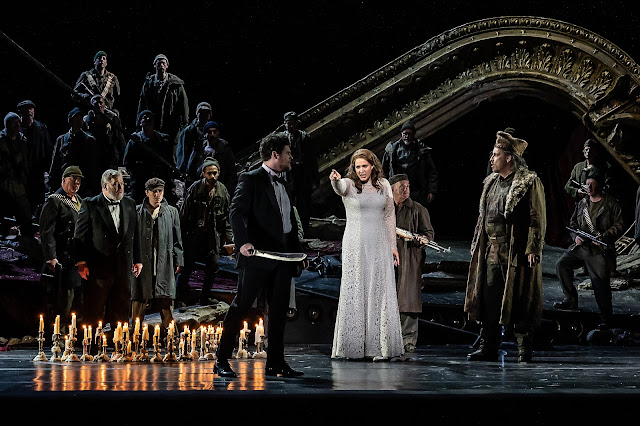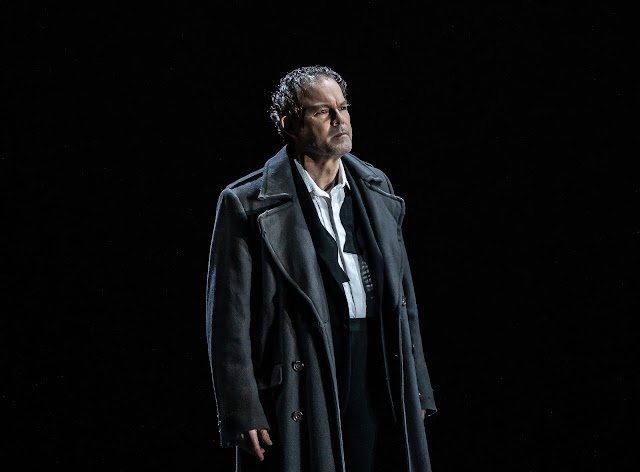Festspielhaus
Hermann, Landgrave of Thuringia - Günter Groissböck
Tannhäuser - Klaus Florian Vogt
Wolfram von Eschenbach - Markus Eiche
Walther von der Vogelweide - Siyabonga Maqungo
Biterolf - Olafur Sigurdarson
Heinrich der Schreiber - Jorge Rodriguez-Norton
Reinmar von Zweter - Jens-Erik Aasbø
Elisabeth - Elisabeth Teige
Venus - Ekaterina Gubanova
Young Shepherd - Julia Grüter
Le Gateau Chocolat - Le Gateau Chocolat
Oskar - Manni Laudenbach
Pages - Cornelia Heil, Ekaterina Gubanova, Laura Margaret Smith, Karolin Zeinert
Tobias Kratzer (director)
Rainer Sellmaier (designs)
Manuel Braun (video)
Reinhard Traub (lighting)
Konrad Kuhn (dramaturgy)
Bayreuth Festival Chorus (chorus director: Eberhard Friedrich)
Bayreuth Festival Orchestra
Nathalie Stutzmann (conductor)
For my third and final Bayreuth performance this year, I revisited an old friend, Tobias Kratzer’s Tannhäuser. New when we met in 2019, it has weathered the pandemic storm and since assumed something close to classic status. Not that, like any of us during that or indeed any other four-year period, it has remained the same. Artists have come and gone, though some have remained: Markus Eiche’s Wolfram, Jorge Rodriguez-Nortonäs Heinrich der Schreiber, and from Kratzer’s new, Ariadne-like troupe, Manni Laudenbach’s Oskar and Le Gateau Chocolat. Memory can play tricks, so this may be a matter of my imagination, but I think Le Gateau Chocolat’s first-interval show had acquired a greater edge as storm clouds have gathered across the world in the battle to preserve, let alone extend, LGBTQ+ rights. (Let us Westerners never forget that, for much of the world, such rights remain a pipe dream.) Calling on Bayreuth to ‘come out of the closet’, explicitly telling the audience it had seen a queer show, and unfurling the rainbow flag (as would soon be done onstage, in the house, at the end of the second act) seemed, in the light of much that has happened, a more political act than ever, as necessary as the Festival’s ongoing exploration of past Jewish contributors.
To take a step back, we first meet he troupe - Tannhäuser, Venus, Le Gateau Chocolat, and Oskar - during the Overture, on Manuel Braun's wonderful video and briefly onstage. Anarchic, hurried, and chronically lacking in cash, they meet tragedy as Venus pushes down on the van’s accelerator to escape the latest, Burger King non-payment predicament and seemingly kills the policeman who had caught them. That affords the occasion for Tannhäuser deciding to leave the band and return to the Bayreuth Festival, pilgrims and all, where Tannhäuser is being played, yet stands in need of an injection of Wagner the Young German revolutionary, who stands behind them at least as much as he does behind his ‘official’ life beyond the grave.
Venus & Co. will not take no for an answer, though, and pursue Tannhäuser, two worlds colliding above all in the Wartburg/Festspielhaus. Venus makes her way onstage as one of the pages, the discipline of an opera performance clearly not to her liking. Her invasion, joined by Le Gateau Chocolat and Oskar, occasions Tannhäuser’s crisis of artistic, sexual, and revolutionary confidence. The third act plays out much as one might have expected, albeit with a touching friendship between Elisabeth and Oskar, and a properly disturbing twist in which Elisabeth cedes to Wolfram but only so long as he is dressed as Tannhäuser. When he attempts to shed Tannhäuser’s clown wig, she adamantly replaces it. The action, though, has been prepared so as to heighten the emotional and intellectual weight of its drama. What may have seemed like an entertaining new story has proved a friend of long standing after all, a friend with whom our own journeys have shared much.
Klaus Florian Vogt, a newcomer to the title role here, did a typically committed, highly well-acted job. His voice remains controversial: put simply, people tend to like it (in a particular role) or not. Leaving that aside, and considering what he does with it, no one would have had reasonable, or even unreasonable, grounds to accord him anything but praise. And when one recalls the not-so-distant days when opera houses struggled to cast any Wagner tenor role, one realises that not everything has changed for the worst. Vogt’s Elisabeth, Elisabeth Teige, proved an unusually powerful presence in the role, her part, seemingly vocal and instrumental in quality, in second-act ensembles something close to awe-inspiring. Her compassion, moreover, was matched by her womanliness: this Elisabeth is avowedly no cipher.
From the rest of a fine cast, Markus Eiche’s Wolfram and Siyabonga Maqungo’s Walther were impressively attendant to the demands of words, music, and stage, as was Günter Groissböck’s Landgrave, luxury casting indeed. Ekaterina Gubanova enthusiastically grasped the challenges and possibilities of Kratzer’s expanded conception of Venus, and added several more for good measure. Julia Grüter shone, strikingly so, as the Young Shepherd. And of course, Le Gateau Chocolat and Laudenbach shone in their roles, as did Eberhard Friedrich’s outstanding Bayreuth Festival Chorus (again!)
There is often a ‘but’, and here it comes. Nathalie Stutzmann’s conducting proved something of a work-in-progress. Balances were often eccentric, sometimes revealing interesting aspects of the score and (especially) its grand opéra origins, as well as affinities with Berlioz, but that eccentricity often proving puzzling rather than enlightening. There was little in the way of greater, ‘music drama’ line, which is fine up to a point if one wishes to highlight where the work, musically, has come from, but some greater sense of overall structure is surely desirable, whichever version of the work one uses. Here, for better or worse, it is Dresden. Perhaps most concerningly, there were occasions, especially during the second act, when ensemble veered dangerously close to collapse. There were, I think, good ideas here, maybe their execution will improve with greater experience in an admittedly difficult house. In any case, there was so much else to enjoy that no one seemed to notice, or care, which perhaps is as it should be. We tend to our communities, or should, as a whole, not as an aggregate of individuals.



%20LISE%20DAVIDSEN%20%C2%A9ROH%20Tannh%C3%A4user%2023%20Ph.Clive%20Barda-250%20adj.jpg)









